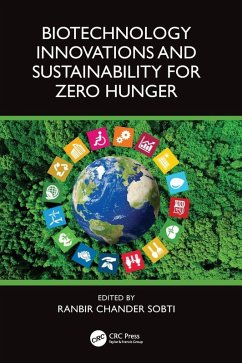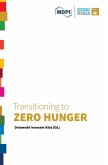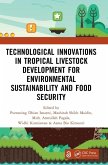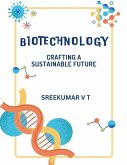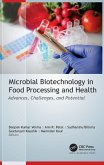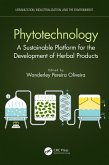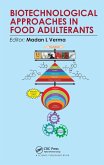Biotechnology Innovations and Sustainability for Zero Hunger
Herausgeber: Sobti, Ranbir Chander
Biotechnology Innovations and Sustainability for Zero Hunger
Herausgeber: Sobti, Ranbir Chander
- Gebundenes Buch
- Merkliste
- Auf die Merkliste
- Bewerten Bewerten
- Teilen
- Produkt teilen
- Produkterinnerung
- Produkterinnerung
This reference book explores the role of biotechnology in achieving zero hunger. It covers food biotechnology, crop improvement, genetic engineering, and GMOs in sustainable agriculture. This book is useful for researchers, academicians, and professionals of biotechnology, agriculture, food science, and sustainability.
Andere Kunden interessierten sich auch für
![Transitioning to Zero Hunger Transitioning to Zero Hunger]() Transitioning to Zero Hunger81,99 €
Transitioning to Zero Hunger81,99 €![Technological Innovations in Tropical Livestock Development for Environmental Sustainability and Food Security Technological Innovations in Tropical Livestock Development for Environmental Sustainability and Food Security]() Technological Innovations in Tropical Livestock Development for Environmental Sustainability and Food Security149,99 €
Technological Innovations in Tropical Livestock Development for Environmental Sustainability and Food Security149,99 €![Biotechnology Biotechnology]() V T SreekumarBiotechnology26,99 €
V T SreekumarBiotechnology26,99 €![Bionanotechnology to Save the Environment Bionanotechnology to Save the Environment]() Bionanotechnology to Save the Environment106,99 €
Bionanotechnology to Save the Environment106,99 €![Microbial Biotechnology in Food Processing and Health Microbial Biotechnology in Food Processing and Health]() Microbial Biotechnology in Food Processing and Health193,99 €
Microbial Biotechnology in Food Processing and Health193,99 €![Phytotechnology Phytotechnology]() Phytotechnology175,99 €
Phytotechnology175,99 €![Biotechnological Approaches in Food Adulterants Biotechnological Approaches in Food Adulterants]() Biotechnological Approaches in Food Adulterants236,99 €
Biotechnological Approaches in Food Adulterants236,99 €-
-
-
This reference book explores the role of biotechnology in achieving zero hunger. It covers food biotechnology, crop improvement, genetic engineering, and GMOs in sustainable agriculture. This book is useful for researchers, academicians, and professionals of biotechnology, agriculture, food science, and sustainability.
Produktdetails
- Produktdetails
- Verlag: CRC Press
- Seitenzahl: 394
- Erscheinungstermin: 30. Juli 2025
- Englisch
- Abmessung: 260mm x 183mm x 26mm
- Gewicht: 934g
- ISBN-13: 9781032678108
- ISBN-10: 1032678100
- Artikelnr.: 72211588
- Herstellerkennzeichnung
- Libri GmbH
- Europaallee 1
- 36244 Bad Hersfeld
- gpsr@libri.de
- Verlag: CRC Press
- Seitenzahl: 394
- Erscheinungstermin: 30. Juli 2025
- Englisch
- Abmessung: 260mm x 183mm x 26mm
- Gewicht: 934g
- ISBN-13: 9781032678108
- ISBN-10: 1032678100
- Artikelnr.: 72211588
- Herstellerkennzeichnung
- Libri GmbH
- Europaallee 1
- 36244 Bad Hersfeld
- gpsr@libri.de
Professor Ranbir Chander Sobti is an Emeritus Professor at the Indian National Science Academy (INSA), New Delhi, and an Honorary Scientist at Panjab University, India. He is the Former Vice¿Chancellor of the Punjab University, Chandigarh, and Babasaheb Bhimrao Ambedkar University (Central University), Lucknow, India. He started his career as a cytogeneticist and then moved on to molecular biology, including genomics, to understand the susceptibility and disease process of cancer, chronic obstructive pulmonary disease, acquired immunodeficiency syndrome, metabolic syndrome, and kidney diseases. Professor Sobti has also used stem cells and nanoparticles to understand the process of tissue organ development through a designed de¿cellularisation protocol. He has published more than 350 research articles in journals of international repute and has also published about five dozen books. Professor Sobti is a Fellow of the Third World Academy of Sciences; the National Academy of Sciences, India; the INSA; the National Academy of Medical Sciences; the National Academy of Agricultural Sciences; the Canadian Academy of Cardiovascular Diseases; and a few others. He was the General President of the Indian Science Congress for the 102nd session held at the University of Jammu, India, in 2013. He is the recipient of many prestigious awards including the INSA Young Scientist Medal, UGC Career Award, Punjab Rattan Award, JC Bose Oration and Sriram Oration Awards, and Lifetime Achievement Awards of the Punjab Academy of Sciences, Zoological Society of India, and the Environment Academy of India. He is a recipient of the prestigious Padma Shree award from the Government of India in 2009 for his outstanding contributions to education.
Biotechnological Innovations for Sustainable Development Towards Zero
Hunger. 2. Biotechnology Applications for Crop Improvement: Opportunities
and Challenges. 3. Biotechnological Interventions: Products and Supplements
Towards Zero Hunger. 4. Crop Protection and Disease Management in Field
Crops. 5. Molecular Techniques for Host Plant Tolerance to Aphid
Infestation in Wheat and Barley. 6. Biofortification: Enhancing Nutrient
Content in Staple Crops. 7. Biotechnological Approaches for Improving
Postharvest Shelf-Life of Fresh Produce. 8. Plant-Microbe Interaction:
Potential for Crop Improvement and Management. 9. Crop Disease Management:
Advancement and Challenges. 10. Genome Assisted Breeding for Crop
Improvement. 11. Opportunities and Challenges for Sustainable Aquaculture
Development and Aquatic Ecosystem Management. 12. Technology-Based
Artificial Meats. 13. Emerging Role of Plant-Based Scaffolding in the Food
Industry: An Overview. 14. Food Safety and Biotechnology. 15.
Immunodiagnostics for Food Safety. 16. Food Waste Monitoring and Analytical
Technologies. 17. Technology-Based Solutions for Food Recovery and
Redistribution. 18. Automation and Robotics in Food Processing. 19. To Be
or Not to Be: Dynamics of Epigenetic Regulation of Somatic Embryogenesis in
Plants. 20. Biological Control: A New Approach Towards Insecticide and
Pesticide-Free Food. 21. Zero Hunger: Role of Speed Breeding and Gene
Editing Techniques. 22. Seed Priming: A Boon to Enhance Crop Resilience to
Different Abiotic Stress. 23. Nanopackaging for Improving Nutritional
Quality of Food. 24. Digital Transformation in Food Security for a More
Nutritious Food System. 25. Role of Marker-Assisted Breeding in Crop
Improvement. 26. Genetic Diversity and Crop Improvement for Food Security.
Hunger. 2. Biotechnology Applications for Crop Improvement: Opportunities
and Challenges. 3. Biotechnological Interventions: Products and Supplements
Towards Zero Hunger. 4. Crop Protection and Disease Management in Field
Crops. 5. Molecular Techniques for Host Plant Tolerance to Aphid
Infestation in Wheat and Barley. 6. Biofortification: Enhancing Nutrient
Content in Staple Crops. 7. Biotechnological Approaches for Improving
Postharvest Shelf-Life of Fresh Produce. 8. Plant-Microbe Interaction:
Potential for Crop Improvement and Management. 9. Crop Disease Management:
Advancement and Challenges. 10. Genome Assisted Breeding for Crop
Improvement. 11. Opportunities and Challenges for Sustainable Aquaculture
Development and Aquatic Ecosystem Management. 12. Technology-Based
Artificial Meats. 13. Emerging Role of Plant-Based Scaffolding in the Food
Industry: An Overview. 14. Food Safety and Biotechnology. 15.
Immunodiagnostics for Food Safety. 16. Food Waste Monitoring and Analytical
Technologies. 17. Technology-Based Solutions for Food Recovery and
Redistribution. 18. Automation and Robotics in Food Processing. 19. To Be
or Not to Be: Dynamics of Epigenetic Regulation of Somatic Embryogenesis in
Plants. 20. Biological Control: A New Approach Towards Insecticide and
Pesticide-Free Food. 21. Zero Hunger: Role of Speed Breeding and Gene
Editing Techniques. 22. Seed Priming: A Boon to Enhance Crop Resilience to
Different Abiotic Stress. 23. Nanopackaging for Improving Nutritional
Quality of Food. 24. Digital Transformation in Food Security for a More
Nutritious Food System. 25. Role of Marker-Assisted Breeding in Crop
Improvement. 26. Genetic Diversity and Crop Improvement for Food Security.
Biotechnological Innovations for Sustainable Development Towards Zero
Hunger. 2. Biotechnology Applications for Crop Improvement: Opportunities
and Challenges. 3. Biotechnological Interventions: Products and Supplements
Towards Zero Hunger. 4. Crop Protection and Disease Management in Field
Crops. 5. Molecular Techniques for Host Plant Tolerance to Aphid
Infestation in Wheat and Barley. 6. Biofortification: Enhancing Nutrient
Content in Staple Crops. 7. Biotechnological Approaches for Improving
Postharvest Shelf-Life of Fresh Produce. 8. Plant-Microbe Interaction:
Potential for Crop Improvement and Management. 9. Crop Disease Management:
Advancement and Challenges. 10. Genome Assisted Breeding for Crop
Improvement. 11. Opportunities and Challenges for Sustainable Aquaculture
Development and Aquatic Ecosystem Management. 12. Technology-Based
Artificial Meats. 13. Emerging Role of Plant-Based Scaffolding in the Food
Industry: An Overview. 14. Food Safety and Biotechnology. 15.
Immunodiagnostics for Food Safety. 16. Food Waste Monitoring and Analytical
Technologies. 17. Technology-Based Solutions for Food Recovery and
Redistribution. 18. Automation and Robotics in Food Processing. 19. To Be
or Not to Be: Dynamics of Epigenetic Regulation of Somatic Embryogenesis in
Plants. 20. Biological Control: A New Approach Towards Insecticide and
Pesticide-Free Food. 21. Zero Hunger: Role of Speed Breeding and Gene
Editing Techniques. 22. Seed Priming: A Boon to Enhance Crop Resilience to
Different Abiotic Stress. 23. Nanopackaging for Improving Nutritional
Quality of Food. 24. Digital Transformation in Food Security for a More
Nutritious Food System. 25. Role of Marker-Assisted Breeding in Crop
Improvement. 26. Genetic Diversity and Crop Improvement for Food Security.
Hunger. 2. Biotechnology Applications for Crop Improvement: Opportunities
and Challenges. 3. Biotechnological Interventions: Products and Supplements
Towards Zero Hunger. 4. Crop Protection and Disease Management in Field
Crops. 5. Molecular Techniques for Host Plant Tolerance to Aphid
Infestation in Wheat and Barley. 6. Biofortification: Enhancing Nutrient
Content in Staple Crops. 7. Biotechnological Approaches for Improving
Postharvest Shelf-Life of Fresh Produce. 8. Plant-Microbe Interaction:
Potential for Crop Improvement and Management. 9. Crop Disease Management:
Advancement and Challenges. 10. Genome Assisted Breeding for Crop
Improvement. 11. Opportunities and Challenges for Sustainable Aquaculture
Development and Aquatic Ecosystem Management. 12. Technology-Based
Artificial Meats. 13. Emerging Role of Plant-Based Scaffolding in the Food
Industry: An Overview. 14. Food Safety and Biotechnology. 15.
Immunodiagnostics for Food Safety. 16. Food Waste Monitoring and Analytical
Technologies. 17. Technology-Based Solutions for Food Recovery and
Redistribution. 18. Automation and Robotics in Food Processing. 19. To Be
or Not to Be: Dynamics of Epigenetic Regulation of Somatic Embryogenesis in
Plants. 20. Biological Control: A New Approach Towards Insecticide and
Pesticide-Free Food. 21. Zero Hunger: Role of Speed Breeding and Gene
Editing Techniques. 22. Seed Priming: A Boon to Enhance Crop Resilience to
Different Abiotic Stress. 23. Nanopackaging for Improving Nutritional
Quality of Food. 24. Digital Transformation in Food Security for a More
Nutritious Food System. 25. Role of Marker-Assisted Breeding in Crop
Improvement. 26. Genetic Diversity and Crop Improvement for Food Security.

